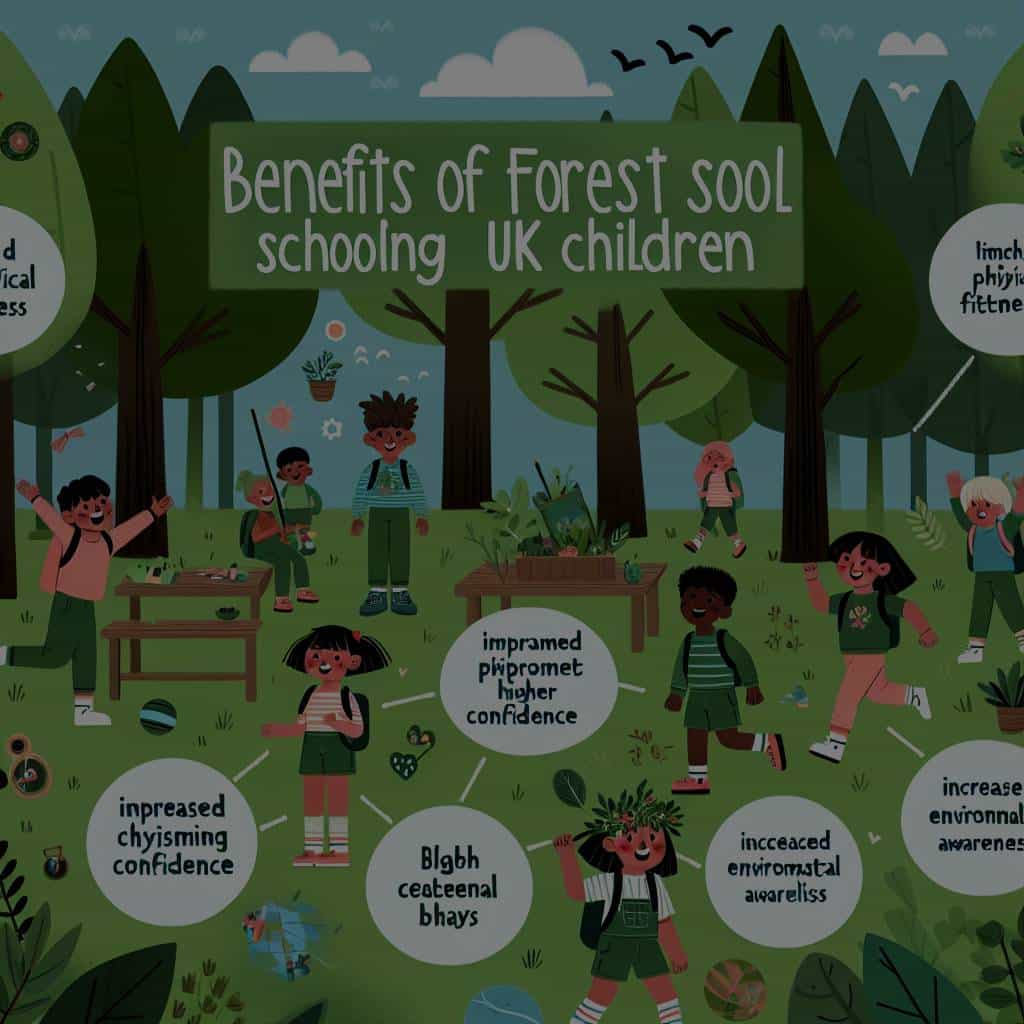What Are the Benefits of Forest Schooling for UK Children?

Forest schooling is becoming increasingly popular in the UK, with growing evidence supporting the positive impact of this approach on British children’s development. The concept of a forest school – an outdoor, nature-based learning environment – is not new, but its implementation within the UK schooling scenario is indeed a significant shift. As you consider the various schooling options for your children, you may wonder: what are the benefits of forest schooling?
The Natural Learning Environment
The first and perhaps most obvious benefit of forest schools is the natural environment in which the learning takes place. Children get to spend a large part of their school time outdoors, learning and playing in a forest. This exposure to nature can have multiple benefits, including improved physical health and increased awareness and appreciation of the environment.
A lire en complément : What Are the Latest Innovations in Composting for UK Households?
Studies have shown that children who spend time outdoors are generally healthier. The natural environment provides them with fresh air and space to move around, which is not always possible in traditional classroom settings. They get ample opportunities to engage in physical activities, which enhances their fitness levels and contributes to overall health.
Furthermore, spending time in the forest also increases children’s awareness of the environment. They learn about different species of plants and animals, observe weather patterns, and understand the importance of preserving nature. This exposure can foster a deep respect for the environment and inspire them to adopt sustainable practices.
A voir aussi : How Can Community Solar Projects Benefit UK Neighbourhoods?
The Development of Essential Skills
The learning activities in a forest school are designed to develop essential skills in children, such as problem-solving, teamwork, and resilience. The forest setting presents various challenges and opportunities for children to work together, think creatively, and overcome obstacles.
For instance, during their forest school sessions, children may find themselves building shelters, identifying plants and insects, or navigating through the forest. These activities require them to use critical thinking and problem-solving skills.
Working in teams during these activities also helps children to develop social skills. They learn how to communicate effectively, cooperate with others, and resolve conflicts. These skills are invaluable not only in their school life but also in their future personal and professional lives.
Moreover, the forest environment can be unpredictable and challenging. Children learn to adapt and respond to unexpected situations, building their resilience. This is a vital skill that prepares them for life’s ups and downs.
Enhancing Learning through Play
Another significant benefit of forest schooling is the emphasis on learning through play. This approach is known to be effective in engaging children and facilitating their learning. The outdoor setting of a forest school provides ample opportunities for children to play and explore, which naturally leads to learning.
During their play in the forest, children may come across various bugs, plants, and natural phenomena that pique their curiosity. These moments of discovery can trigger questions and discussions, initiating learning in a fun and engaging way.
Moreover, play also aids in the development of imagination and creativity. As children manipulate natural materials and engage in pretend play, they think creatively and come up with unique ideas. This helps to develop their cognitive abilities and enhances their creative skills.
Fostering a Love of Learning
Forest schools aim to foster a love of learning in children by providing a stimulating and enjoyable learning environment. Traditional classroom settings may sometimes be restrictive and monotonous, making learning a chore rather than a joy. Forest schools, on the other hand, offer a variety of experiences that keep children engaged and excited about learning.
In the forest, every day brings new experiences and discoveries, making learning an adventure. Children look forward to their time in the forest, eager to explore and learn. This positive attitude towards learning can have a lasting impact, setting the stage for lifelong learning.
Moreover, the forest school approach respects the individual learning pace and interests of each child. They are given the freedom to explore areas of their interest, which enhances their motivation to learn. This autonomy and respect can boost their confidence and self-esteem, further promoting their love of learning.
A Holistic Approach to Child Development
Finally, the forest school offers a holistic approach to child development. It aims to nurture not only the cognitive and physical abilities of children but also their emotional and social skills. This comprehensive focus ensures the overall well-being and development of the child.
In a forest school, children learn to recognise and express their emotions effectively. They interact with their peers and teachers in a supportive environment, which helps them to develop healthy relationships. They also learn to respect and care for nature and other living beings, nurturing their empathy and compassion.
Furthermore, forest school activities often involve elements of risk and challenge. This provides opportunities for children to test their limits and learn to manage risks. This experience can help them to develop confidence and resilience, preparing them for future challenges.
Empowering Young People through Forest Schooling
Forest schools not only provide a natural learning environment but also empower young people by offering them autonomy in their learning process. This empowerment comes from the freedom they are given to explore their interests at their own pace. In this way, forest schools encourage children to take an active role in their learning, thereby fostering their independence and self-confidence.
At a forest school, children are not confined to a structured curriculum. Instead, they are allowed to follow their curiosity and explore various topics of interest. This could involve identifying different tree species, observing animal behaviour, or exploring the properties of soil. The learning at a forest school is curiosity-driven, making it meaningful and relevant to the children.
Children are also involved in decision-making processes regarding their learning. They may decide which activities to engage in, how to approach a problem, or how to organise their day. This active participation in decision-making helps to develop their problem-solving skills and promotes responsibility and accountability.
In addition, the nature-based activities at a forest school often involve physical work such as den building or outdoor play. These activities not only promote physical health but also offer children a sense of achievement. This boosts their confidence and fosters a sense of self-efficacy – the belief in their abilities to accomplish tasks and overcome challenges.
Long-Term Advantages of Forest Schooling
The benefits of forest schooling are not limited to the early years but can have long-term effects on children’s development and well-being. The skills and attitudes children develop at a forest school – including problem-solving, teamwork, resilience, curiosity, and respect for nature – can greatly benefit them in their future academic, personal, and professional lives.
The problem-solving and critical thinking skills that children develop during their forest school sessions can help them to excel acadically. These skills are essential for understanding complex concepts and ideas, conducting research, and making informed decisions.
The teamwork and communication skills that children learn in a forest school setting can also benefit them in their personal and professional relationships. They learn to listen to others, express their thoughts clearly, work collaboratively, and resolve conflicts in a constructive manner.
Moreover, the resilience and adaptability that children develop in the unpredictable forest environment can prepare them for life’s ups and downs. They learn to cope with difficulties, adapt to new situations, and bounce back from setbacks.
Finally, the respect for nature that children develop at a forest school can inspire them to adopt sustainable practices and contribute to environmental conservation. This is not only beneficial for the environment but is also increasingly valued in many professions.
In conclusion, forest schools offer a unique and highly beneficial learning environment for UK children. They provide a natural setting for learning, foster essential skills, promote learning through play, instil a love of learning, and offer a holistic approach to child development. With their emphasis on empowerment and long-term development, forest schools can play a vital role in preparing children for a successful and fulfilling future.
